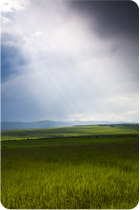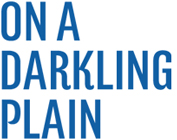 |
Tuesday, March 10 & Wednesday, March 11, 8pm |
Programme notes
By Jurgen Petrenko
Pity the artist: cursed with the ability to see beyond the mundane, and with the compulsion to strive to express the inexpressible; more misunderstood than ever in our ever more rational world, where the continuing explosion of scientific knowledge leaves ever shrinking habitat for anything that cannot be quantified, and has little use for the mysterious realm beyond facts. Pity the visionary, in a world where the purpose of communication has become the broadcasting of trivialities with our thumbs.
Though the details continue to change, this trend has been underway for many decades, and was experienced in different ways by the poets and musicians on our programme tonight. All strive to find meaning in a world shaped by political oppression, societal decline, and all the woes our world has to offer.
And yet,
the surprising and encouraging commonality among them all is an
unexpected sense of hope that there is something good even in our
discouraging reality, and in the unknown realms beyond our
understanding. It is a message of hope that rings through the ages for
any who are inclined to hear.
Samuel Barber: Dover Beach. Poem by Matthew Arnold
Dmitri Shostakovich: Seven Romances on Poems by Alexander Blok
Juliet Hess: The Cloths of Heaven. Poetry by W.B. Yeats
John Tavener: Akhmatova Songs. Poetry by Anna Akhmatova
Walford Davies: Prospice. Poem by Robert Browning
Samuel Barber: Dover Beach, for baritone and string quartet. Poem by Matthew Arnold.
Matthew Arnold (1822-1888) was the son of Thomas Arnold, well-known as the headmaster of the famous Rugby School in Warwickshire. As such, Matthew benefitted from the finest education England had to offer, continuing on to study at Oxford. Although he was a published poet and essayist from a fairly young age, throughout his life he found it necessary to support his writing by working first as a school inspector, and later as a professor of poetry at Oxford. An avid member of the Athenaeum Club, he was known as a sparkling conversationalist, and was fond of dinner parties, as well as shooting and fishing excursions. This seems surprising, as his writing was frequently criticized for its "high seriousness".
Dover Beach was written in 1851, while Arnold was on his honeymoon, and it certainly speaks to his serious side. The poem is as enigmatic as it is atmospheric, and both aspects are supported beautifully by Barber's setting.
American
composer Samuel Barber (1910-1981) was a child prodigy, and was
enrolled at the prestigious Curtis Institute in Philadelphia at the age
of 14, majoring in piano, composition, and voice. His successes began
early and continued throughout his life. Dover Beach was composed when
he was only 21, but it shows remarkable maturity and sensitivity to the
text.
Dmitri Shostakovich: Seven Romances on Poems by Alexander Blok, for soprano, violin, cello and piano
Of all the artists labouing in Soviet Russia, Dmitri Shostakovich (1906-1975) seems to have been one of the most successful at (for the most part) maintaining an uneasy truce between his own artistic integrity, and the demands of Joseph Stalin's cultural henchmen. He was a compulsive man, obsessed with cleanliness and punctuality. He regularly synchronized the clocks in his home, and he also frequently sent cards to himself to test the efficiency of the postal service.
Alexander Blok (1880-1921) was a very different personality, less driven and more inclined to enjoy life's pleasures. He grew up with aristocratic relatives and became a celebrated poet early in life. However, he fell into despondency after the Russian revolution, and died a few years afterwards. His poems are imbued with a sense of sadness and foreboding.
Seven Romances
was written in 1967. By then, Shostakovich had begun to experiment with
modernist techniques, and he uses the inherent remoteness of the
12-tone system to devastating effect in "Storm" and "Secret Signs". But
his commitment to communicating on an emotional level (along with, it
must be said, the aesthetic demands of the Soviet state) meant that he
never fully joined the ranks of the avant-garde. In Seven Romances
there is always a tonal context, and no one "system" accounts for the
emotional space that is at times plaintive, pensive, mysterious and
even romantic. What contributes most to the piece's powerful effect it
its astonishing economy of means: the instruments are used so sparingly
that the entire ensemble only comes together in the last song. The
result is simplicity of texture that balances on the fine line between
bleakness and serene beauty.
Juliet Hess: The Cloths of Heaven, for baritone, flute, oboe, violin, viola, cello, and piano. Poetry by W.B. Yeats
Juliet Hess is currently an assistant professor of music education at the Setnor School of Music at Syracuse University, with a dual appointment in the School of Education. She teaches undergraduate and graduate courses in elementary and secondary school methods, foundations in music education, assessment in music education, and choral literature for elementary and secondary school teaching. She has also distinguished herself as a composer, with a strong interest in vocal writing. The Cloths of Heaven was originally written in 2007, but was re-orchestrated by the composer for this evening's performance.
About this work Hess says:
Having always been interested in Yeats' poetry, I was drawn to these
poems in particular because of the diversity of moods and the dramatic
changes in some of the poems – the sudden dark turns in some cases and
moments of lightness in others. The poems challenged me to create
moments of mystery, suspense, humour, wonder, and the depths of
darkness and foreboding.
The
instruments in this orchestration play specific roles in creating these
different moods, and oftentimes take on a "character quality" with a
real focus on creating a variety of different textures. The poetry
allowed for an exploration of instrumental and vocal tone colours and
challenged me to explore the full palette in a way that would allow the
poetry to speak.
John Tavener: Akhmatova Songs, for soprano and string quartet. Poetry by Anna Akhmatova
While most composers look beyond the present into the future for answers, John Tavener (1944-2013) found his solutions in the past. In 1977, he became a devout member of the Orthodox Church, and his music became increasingly rooted in that tradition. He observed that it is a tradition has never been touched by a Renaissance or a Reformation, and so flows in one unbroken line. He felt that it was not he himself, but the tradition speaking through his works.
Anna
Akhmatova (1889-1966) was a highly-regarded Russian modernist poet.
Unfortunately the world's esteem was not shared by the regime of Joseph
Stalin, and she suffered greatly at its hands. Nevertheless she made no
attempt to emigrate, but stayed as a witness to those terrible times.
John Tavener writes:
The six poems that I have chosen from
Akhmatova were written at different periods in her life. The first
three suggest her veneration of other poets – Dante, Pushkin and
Lermontov, and Pasternak. In the central couplet she mistrusts praise
of her own work. Then comes her own longing to write, as the Muse
comes. The last poem, "Death", looks forward to her own death (with the
suggestion of a personal after-life); its inevitability and her own
longing for it.
Walford Davies: Prospice, for baritone and string quartet. Poem by Robert Browning
H. Walford Davies (1869-1941) grew up in a house brimming with music, and began his formal education as a chorister at St. George's Chapel in Windsor Castle. The work we are hearing this evening is an early one, dedicated to a Mrs. Matheson, who was his landlady and mentor, and who nursed him through a long illness. Robert Browning was a favourite of hers, and she would often read his poetry to Davies during his convalescence. He frequently requested "Prospice", much to her concern, as the poem seems to focus on preparing for and embracing death, rather than concentrating on getting well.
Fortunately, Davies did recover, and went on to a very successful career as a composer, conductor, educator, broadcaster, and organist. For many years he was the organist at the Temple Church in London's Law Courts district (and for a time, no less a musician than Leopold Stokowski was his assistant). This imposing edifice was built in the 12th century by the Knights Templar as their London headquarters, and managed to survive the dissolution of that order as well as the great fire of 1666. Abounding with symbolism, it was featured prominently in Dan Brown's novel The Da Vinci Code.
Davies was knighted in 1922, and was appointed the successor to Edward Elgar as Master of the King's Music in 1934. A very prominent musician in his time, Davies is little remembered today outside the world of Anglican church music.
 |
 |
